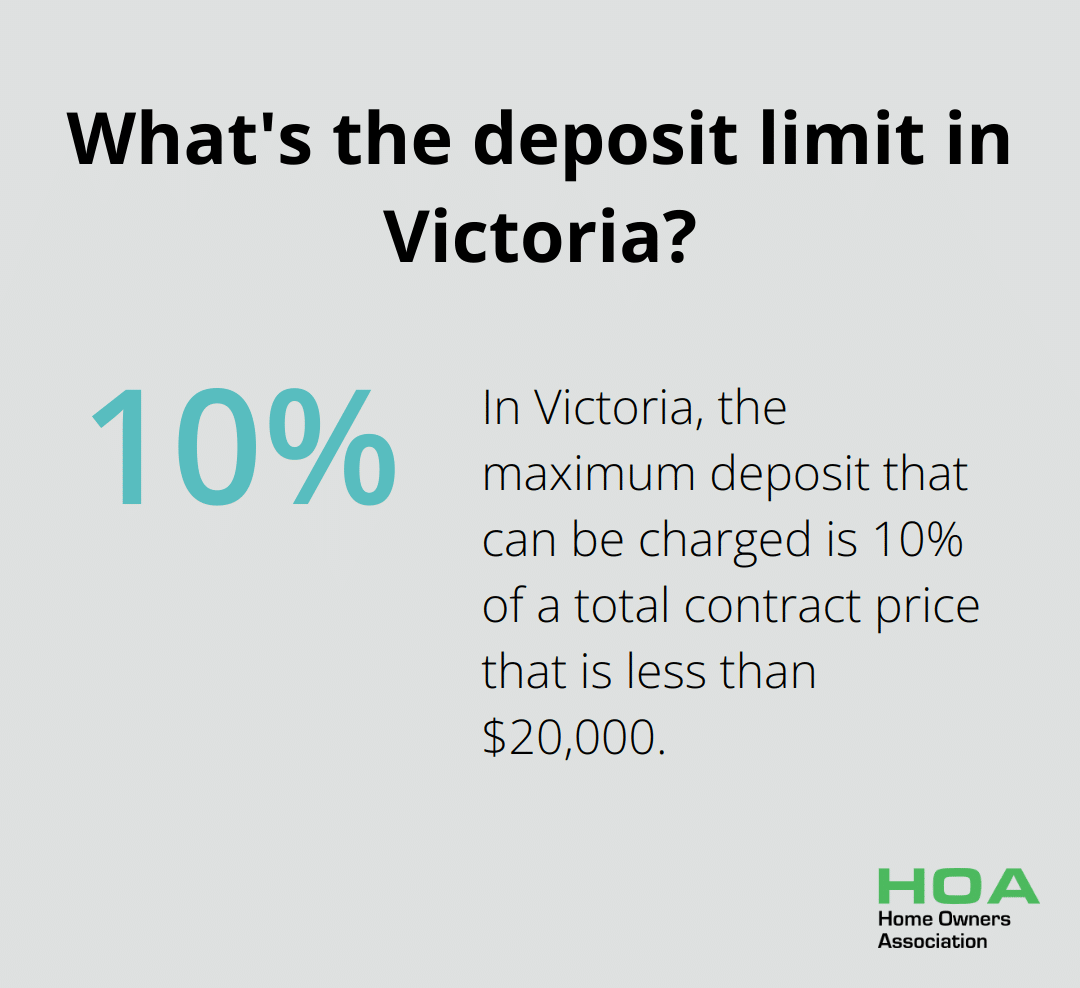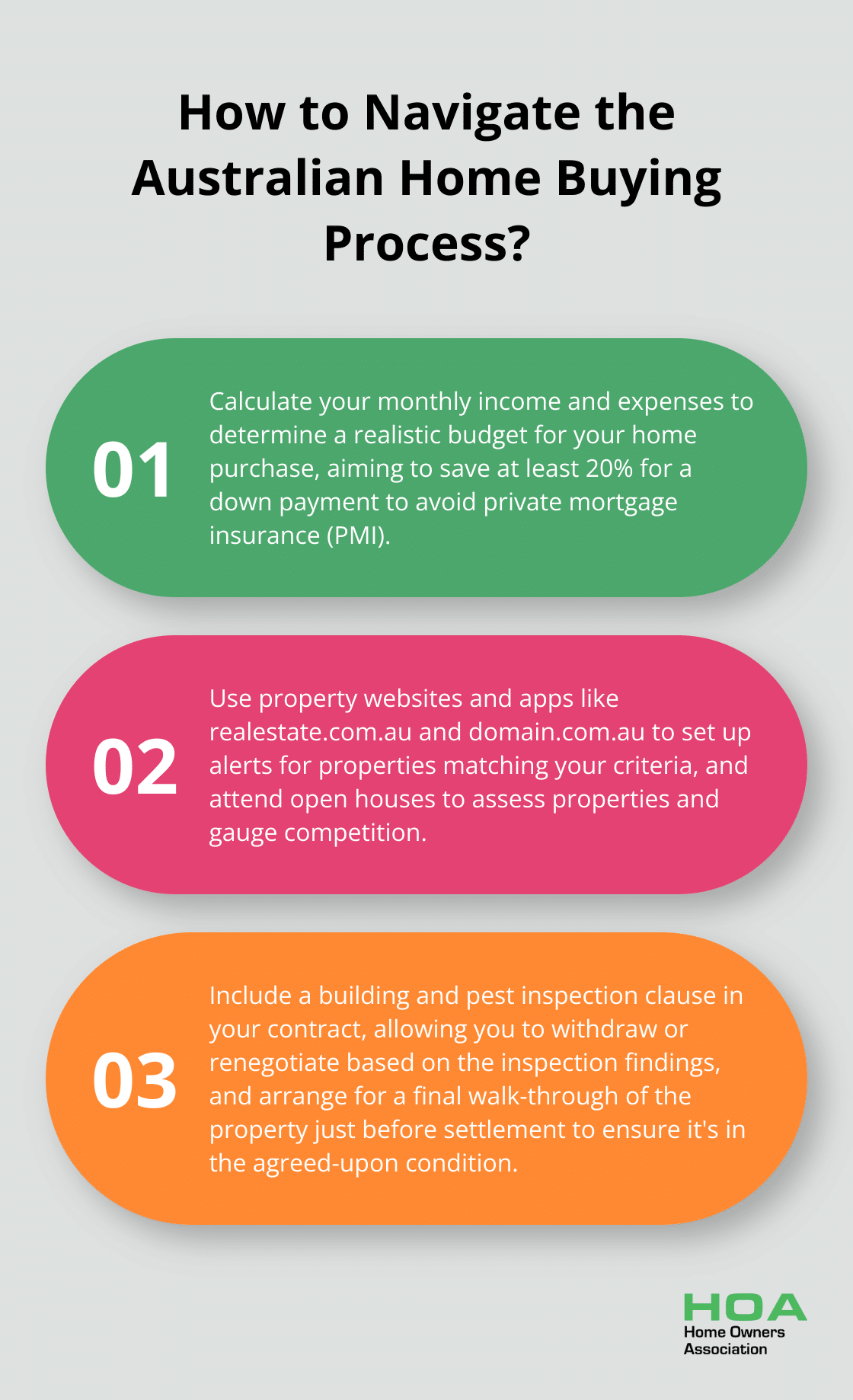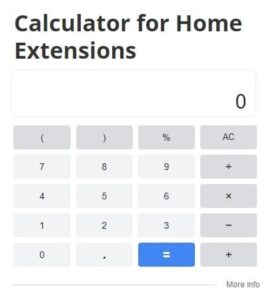
Buying your first home is an exciting milestone, but it can also be overwhelming. At Home Owners Association, we understand the challenges first-time buyers face in today’s competitive real estate market.
This guide offers essential tips when buying a home, covering everything from financial preparation to navigating the closing process. We’ll help you make informed decisions and turn your homeownership dreams into reality.
How to Prepare Financially for Your First Home
Assess Your Financial Health
Start your home buying journey by evaluating your current financial situation. Calculate your monthly income and expenses to determine a realistic budget for your home purchase. The National Association of Realtors recommends saving at least 20% for a down payment to avoid private mortgage insurance (PMI). With median home prices in Australia at $977,343 for houses and $685,291 for units (as of February 2025), substantial savings are necessary.
Explore Mortgage Options
Understanding different mortgage types is essential for first-time buyers. Fixed-rate mortgages provide stability with consistent payments, while variable-rate loans might offer lower initial rates but can fluctuate. As of February 2025, the average interest rate for owner-occupier principal and interest home loans in Australia stands at 6.82%. We recommend speaking with multiple lenders to compare rates and terms. Don’t forget to account for additional costs like stamp duty (which can add up to 5% of the property’s value).
Boost Your Credit Score
Your credit score significantly impacts your ability to secure favorable mortgage terms. Focus on paying down existing debts, especially high-interest credit cards. Avoid applying for new credit in the months leading up to your home purchase. A score above 620 typically qualifies you for better mortgage rates (as noted by FICO). However, try to achieve an even higher score to secure the best possible terms.
Clean Up Your Finances
To improve your chances of approval, tidy up your finances before applying for pre-approval. Lenders scrutinize your spending habits, so maintain a consistent savings pattern and avoid large, unexplained transactions. Consider setting up automatic savings transfers to demonstrate financial discipline.
Stay Informed and Prepared
Financial preparation is an ongoing process. Keep yourself updated on market trends and government incentives for first-time buyers. The Australian Bureau of Statistics serves as an excellent resource for relevant housing data and trends. These steps will position you to make a competitive offer when you find your dream home.

Now that you’ve laid a solid financial foundation, it’s time to focus on finding the right property that meets your needs and preferences.
How to Find Your Ideal Property
Create a Comprehensive Property Wishlist
Start your property search by listing your must-have features and those you can compromise on. Consider factors such as the number of bedrooms, outdoor space, parking, and proximity to work or schools. Set realistic expectations about your budget constraints and prepare to make trade-offs. First-time buyers spend on average 18% of their income on housing costs, according to the ABS survey.
Explore Neighborhoods Thoroughly
Conduct extensive research on potential neighborhoods before committing to a property. The Australian Bureau of Statistics provides valuable demographic information to help inform your choice. Check local crime rates, future development plans, and transport links. Visit areas at different times of day to get a feel for the community. A property’s value is heavily influenced by its surroundings, so choose wisely.
Partner with an Experienced Real Estate Agent
A knowledgeable local agent can prove invaluable in your property search. Look for someone with extensive experience in your target areas. They should provide insights on market trends, negotiation strategies, and off-market opportunities. Ask for references and check their track record of successful sales. A good agent will save you time and potentially money in the long run.
Leverage Technology in Your Search
Use property websites and apps to streamline your search. Platforms like realestate.com.au and domain.com.au offer comprehensive listings and market data. Set up alerts for properties matching your criteria to stay ahead of the competition. Virtual tours have become increasingly common, allowing you to preview homes without leaving your couch. However, always follow up with in-person visits for properties you’re serious about.
Attend Open Houses
Open houses remain a critical part of the property search process. These events allow you to assess the property’s condition, gauge competition, and get a feel for the neighborhood. Take notes and photos during visits to help you compare options later. Don’t hesitate to ask the agent or current owners detailed questions about the property and its history.

As you navigate the property market, maintain focus on your goals but remain open to opportunities. The perfect home might not tick every box on your wishlist, but it should meet your most important needs and feel right for you (and your family, if applicable). With thorough research and the right support, you’ll equip yourself to find a property that not only meets your current needs but also serves as a solid investment for your future.
Now that you’ve identified potential properties, it’s time to move on to the next crucial step: making an offer and navigating the home buying process.
How to Navigate the Home Buying Process
Make a Competitive Offer
In Australia’s competitive real estate market, a strong offer is essential. CoreLogic data indicates that capital city home sales over the past three months are 4.6% lower than a year ago and 2.0% below the previous five-year average. Research recent sales of similar properties in the area to determine a fair price. Your real estate agent can provide valuable insights on local market conditions and help you structure your offer.

Include a personal letter with your offer to create an emotional connection with the seller. This can be particularly effective in a competitive situation where multiple offers are on the table. However, focus your letter on your appreciation for the property rather than personal circumstances that might weaken your negotiating position.
Prepare for counteroffers and negotiations. Decide on your maximum price beforehand and stick to it to avoid overstretching your budget in the heat of the moment. Price isn’t the only factor – settlement dates and included fixtures can also be negotiating points.
Schedule Professional Inspections
Once your offer is accepted, immediately schedule a professional building and pest inspection. This step can save you from costly surprises down the line. According to the Housing Industry Association, in Victoria, the maximum deposit that can be charged is 10% of a total contract price that is less than $20,000, or 5% of a total contract price that is $20,000 or more.
Include a building and pest inspection clause in your contract. This allows you to withdraw or renegotiate based on the inspection findings. Pay close attention to structural integrity, electrical systems, plumbing, and any signs of pest infestation. Ask the inspector for detailed explanations of their findings.
Complete the Closing Process
The closing process (also known as settlement) is the final step in your home buying journey. This typically occurs 30 to 90 days after the offer is accepted, depending on the terms of your contract. During this time, your lender will finalize your mortgage, and your solicitor or conveyancer will handle the legal aspects of the transfer.
Prepare for additional costs at this stage. Your solicitor can provide a detailed breakdown of all closing costs well in advance.
Arrange for a final walk-through of the property just before settlement. This ensures the property is in the agreed-upon condition and that any repairs negotiated after the inspection have been completed.
Plan Your Move
As settlement day approaches, start planning your move. Get quotes from several moving companies and book well in advance (especially if you’re moving during peak periods). Start packing non-essential items early to spread out the workload.
Notify relevant parties of your change of address. This includes your employer, bank, insurance companies, and government agencies. Arrange for utilities to be connected at your new home from the day of settlement to ensure a smooth transition.
Consider taking out home insurance from the date of settlement, even if you’re not moving in immediately. This protects your new asset from the moment it becomes legally yours.
Final Thoughts
Your first home purchase marks a significant milestone in your life. We at Home Owners Association have provided you with essential tips when buying a home to navigate this exciting journey. Our guidance covers financial preparation, property selection, and the intricacies of the buying process.

Homeownership offers numerous benefits, from building equity to creating a personalized living space. The perfect property might not appear immediately, so patience and flexibility will serve you well during your search. You may need to adjust your expectations or expand your search criteria to find the right fit.
Home Owners Association remains committed to supporting you throughout your homeownership journey. Our exclusive benefits and expert guidance can help you save money on home projects while ensuring high-quality results. We look forward to being part of your exciting new chapter as a homeowner.





